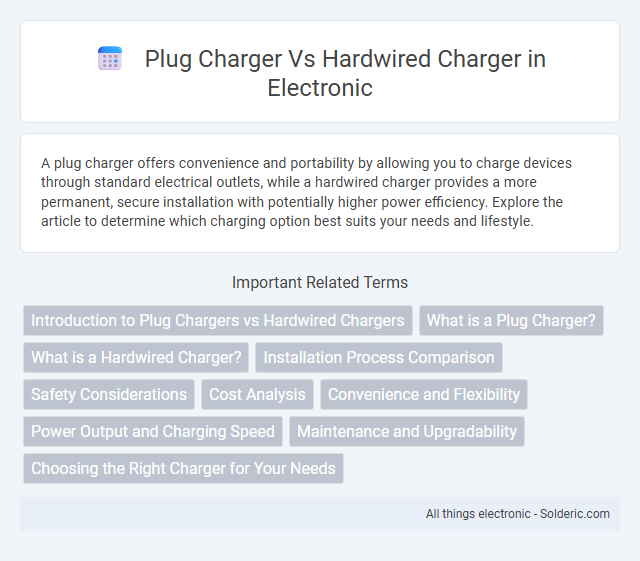A plug charger offers convenience and portability by allowing you to charge devices through standard electrical outlets, while a hardwired charger provides a more permanent, secure installation with potentially higher power efficiency. Explore the article to determine which charging option best suits your needs and lifestyle.
Comparison Table
| Feature | Plug Charger | Hardwired Charger |
|---|---|---|
| Installation | Simple, plug into outlet | Permanent, requires electrician |
| Portability | High, can move easily | Fixed location |
| Power Output | Lower, typically up to 3.7 kW | Higher, up to 22 kW or more |
| Safety | Standard outlet safety | Dedicated circuit, enhanced safety |
| Cost | Lower upfront cost | Higher installation cost |
| Convenience | Quick setup, less hassle | Seamless, no unplugging needed |
| Applications | Home or travel use | Residential or commercial fixed charging |
Introduction to Plug Chargers vs Hardwired Chargers
Plug chargers offer a versatile and portable solution for charging electric vehicles or devices, connecting easily to standard power outlets without requiring professional installation. Hardwired chargers, installed permanently and directly connected to the electrical system, provide a more stable and often faster charging experience suitable for dedicated charging stations. Both options cater to different user needs, balancing convenience, charging speed, and installation complexity.
What is a Plug Charger?
A plug charger is a portable charging device that connects to standard electrical outlets via a plug, allowing you to easily charge your electronic devices without permanent installation. It offers flexibility and convenience for charging smartphones, tablets, and laptops, making it ideal for travel or temporary use. Unlike hardwired chargers, plug chargers can be unplugged and used across different locations without professional setup.
What is a Hardwired Charger?
A hardwired charger is an electric vehicle charging solution directly connected to your home's electrical system without a plug, offering a cleaner, more permanent installation. Unlike plug chargers that use standard outlets for connection, hardwired chargers provide enhanced safety, reliability, and often support higher charging capacities. For your EV, this means faster charging times and reduced risk of accidental disconnection.
Installation Process Comparison
Plug chargers offer a straightforward installation process, requiring only a compatible outlet and minimal technical expertise, making them ideal for DIY setup. Hardwired chargers demand professional installation due to direct electrical connections, ensuring compliance with safety standards and often necessitating circuit upgrades. Your choice affects installation complexity, time, and potential costs, with plug chargers providing ease and hardwired units offering a permanent, integrated solution.
Safety Considerations
Plug chargers offer the advantage of portability and ease of replacement, but they pose risks of electrical faults if damaged or improperly connected, increasing the hazard of electric shock or fire. Hardwired chargers, installed directly into the electrical system, provide a safer, more secure connection with reduced risk of accidental disconnection or damage, ensuring consistent power delivery and compliance with electrical codes. Proper installation by a licensed electrician is critical for hardwired chargers to maximize safety and prevent potential hazards such as overloads or faulty wiring.
Cost Analysis
Plug chargers typically incur lower upfront costs, with prices ranging from $50 to $200 depending on power output, while hardwired chargers often require professional installation fees between $300 and $1,000 in addition to equipment costs. Over time, hardwired chargers may offer better durability and potentially lower maintenance expenses, but your initial investment is significantly higher compared to plug-in models. Evaluating total cost of ownership, including installation, equipment, and long-term reliability, helps determine which charger best fits your budget and charging needs.
Convenience and Flexibility
Plug chargers offer superior convenience and flexibility due to their portability and easy installation, allowing users to charge devices anywhere with an accessible outlet. Hardwired chargers require professional installation and remain fixed, limiting mobility but providing a more permanent, reliable power source. Choosing between the two depends on the user's need for mobility versus a stable, dedicated charging solution.
Power Output and Charging Speed
Hardwired chargers generally offer higher power output and faster charging speeds compared to plug chargers due to their direct connection to the electrical system, allowing consistent and optimized energy delivery. Plug chargers are limited by the standard outlet power capacity, which can slow down charging times for high-capacity batteries. To maximize your device's charging efficiency, choosing a hardwired charger ensures a more reliable and rapid power supply.
Maintenance and Upgradability
Plug chargers offer easier maintenance as they can be quickly disconnected and replaced without professional assistance, minimizing downtime for Your device. Hardwired chargers require expert service for maintenance or upgrades, which can be more time-consuming and costly, but provide a stable, tamper-resistant connection. Upgradability is more straightforward with plug chargers due to modular components, while hardwired systems may need partial rewiring or extensive modification to accommodate new technology.
Choosing the Right Charger for Your Needs
Selecting between a plug charger and a hardwired charger depends on convenience and installation requirements. Plug chargers offer portability and easy setup for temporary or flexible use, while hardwired chargers provide a permanent, streamlined solution with higher power capacity for consistent electric vehicle charging. Assess your location, charging frequency, and power needs to determine the optimal charger type tailored to your lifestyle and vehicle specifications.
plug charger vs hardwired charger Infographic

 solderic.com
solderic.com